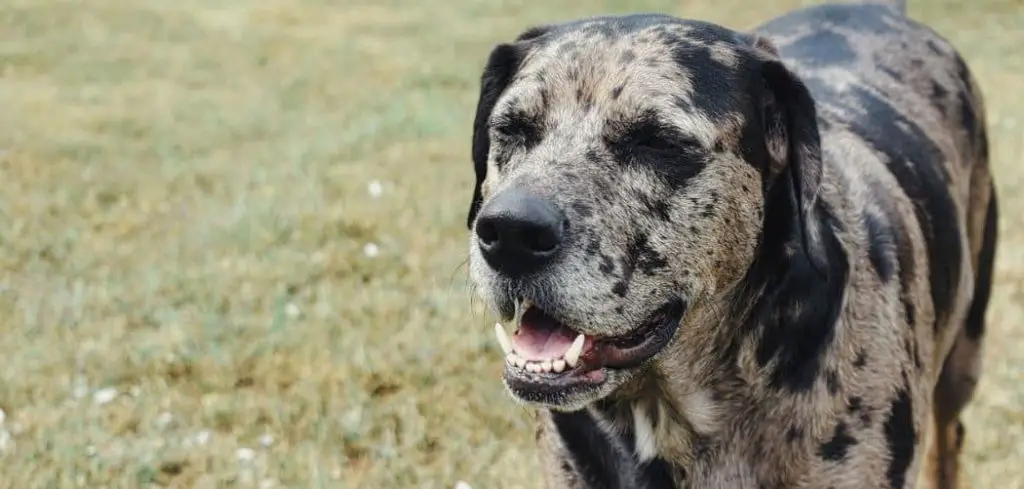If your dog is drinking a lot of water and breathing heavily, it’s a concerning combination that may point to serious health issues. While both symptoms can occur separately due to heat or exertion, together they could signal internal distress or organ dysfunction.
We outline the common causes of dog drinking a lot of water and breathing heavy, what you can do at home, and when to seek veterinary help.
Dog Drinking a Lot of Water and Breathing Heavy — Why It Happens
Dogs that are panting heavily and drinking more water may be dealing with pain, heatstroke, heart disease, respiratory infections, or hormonal conditions like Cushing’s disease or diabetes. These conditions interfere with your dog’s ability to regulate temperature, oxygen, or fluids—causing them to breathe faster and seek more hydration.

Common Causes of Dog Drinking a Lot of Water and Breathing Heavy
Heatstroke or Overheating
Heavy panting and thirst are classic signs of heatstroke. Dogs cool themselves through panting, and when temperatures rise or exertion increases, they drink more to stay hydrated.
In severe cases, dogs may develop red gums, vomiting, lethargy, or collapse. This is an emergency requiring immediate cooling and veterinary care.
Short-nosed breeds (like Bulldogs or Pugs) are at higher risk, especially in hot weather or poorly ventilated areas.
Heart Disease
When the heart can’t pump blood effectively, oxygen levels drop. Dogs breathe heavily to compensate and may also drink more due to reduced circulation or medications.
Other signs include coughing, fainting, exercise intolerance, and a swollen abdomen.
Veterinary evaluation often includes X-rays, ultrasound, and heart medications to manage the condition.
Respiratory Infections or Lung Disease
Conditions like pneumonia, bronchitis, or laryngeal paralysis can cause labored breathing.
The increased water intake may be due to fever, inflammation, or discomfort.
You may hear wheezing, observe nasal discharge, or notice your dog refusing to lie down. Prompt antibiotic or supportive treatment is usually required.
Pain or Anxiety
Dogs experiencing pain from injuries, arthritis, or internal issues may breathe faster due to stress.
Increased drinking may occur alongside panting, restlessness, or pacing.
Pain management or calming strategies (for anxiety) can help relieve both symptoms. Your vet may recommend anti-inflammatories or behavioral support.
Read more: Dog Drinking a Lot of Water and Shaking (Is it serious?)
Cushing’s Disease
Cushing’s disease causes an overproduction of cortisol, a hormone that increases thirst and affects metabolism.
Affected dogs often pant excessively even at rest, develop a pot-bellied appearance, and show thinning skin or hair loss.
Diagnosis involves hormone testing, and treatment may include daily medication to control cortisol levels.
Diabetes Mellitus
Uncontrolled blood sugar can lead to dehydration, triggering excessive thirst and increased respiration.
Dogs may also appear lethargic, lose weight, or have accidents in the house. Advanced diabetes may lead to ketoacidosis, a serious and life-threatening complication.
Blood tests and urine sampling confirm diagnosis. Insulin and dietary management are essential for long-term care.
What to Do If Your Dog Is Drinking a Lot and Breathing Heavy
Move your dog to a cool, well-ventilated space and provide fresh water—but discourage gulping large volumes quickly.
Take note of any other symptoms, like coughing, lethargy, fever, or appetite loss.
Avoid exercise or stress until your dog is evaluated by a vet.
Do not give human medications, as they may worsen the condition.
If your dog appears weak, confused, or unable to rest comfortably, seek immediate veterinary care.
When to Call or Visit Your Vet
Get veterinary help right away if your dog:
Pants heavily even while resting
Drinks excessive water for more than 24 hours
Shows signs of distress like drooling, vomiting, or collapsing
Has pale or blue gums
Coughs, wheezes, or appears short of breath
Your vet may run chest X-rays, blood panels, hormone tests, or ultrasound depending on the suspected cause.
Read more: Dog Drinking a Lot of Water and Lethargic (When to worry )
Key Takeaway
Heavy breathing and increased thirst in dogs are not symptoms to brush off—they often point to heatstroke, organ strain, or serious disease.
Take fast action, especially if your dog’s condition worsens or they show signs of distress. Timely veterinary care can uncover the cause and start effective treatment.
